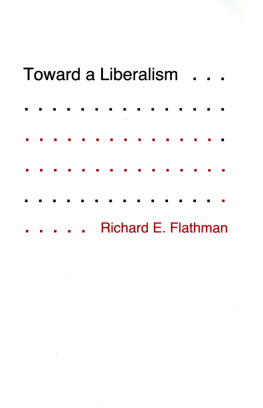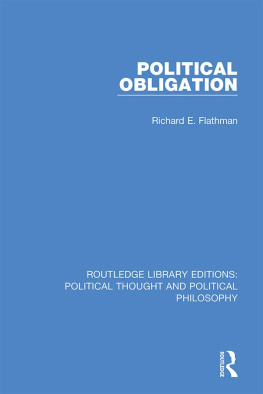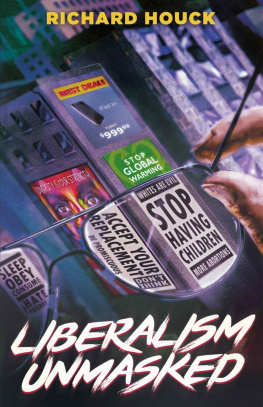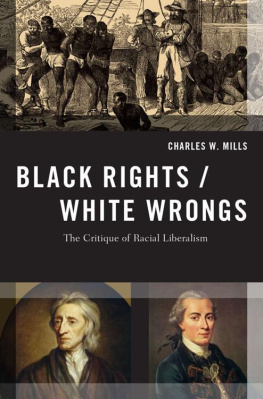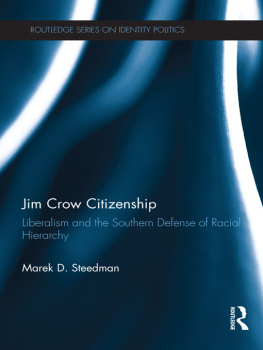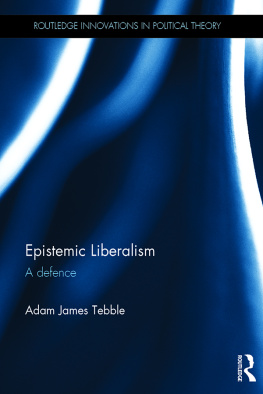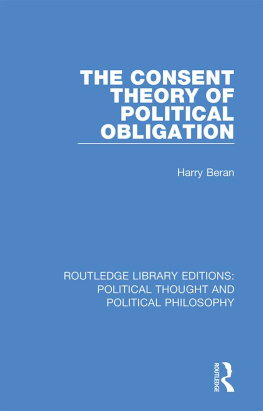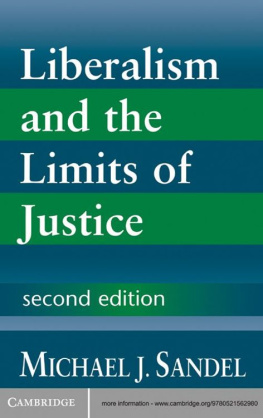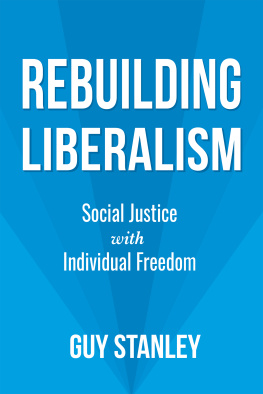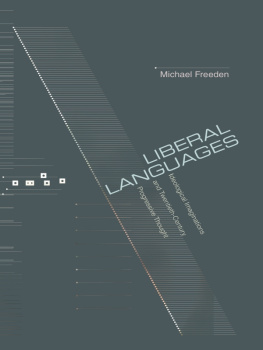Acknowledgments
The introduction and Chapters 1 and 6 of this volume are here published for the first time. The other chapters appeared earlier, and permission to reprint them was generously granted by the publishers: Chapter 2, Liberalism and Authority, in The Prospects of Liberalism, edited by Timothy Fuller, Colorado College Studies, no. 20 (Colorado Springs, 1984), pp. 4157; Chapter 3, Citizenship and Authority: A Chastened View of Citizenship, News for Teachers of Political Science, no. 30 (Summer 1981) (Washington, D.C.: American Political Science Association, 1981), pp. 919; Chapter 4, Liberalism and the Human Good of Freedom, in Liberals on Liberalism, edited by A. J. Damico (Totowa, N.J.: Rowman & Littlefield, 1986), pp. 6794; Chapter 5, Moderating Rights, in Human Rights, edited by Ellen Frankel Paul, Fred D. Miller, Jr., and Jeffrey Paul (Oxford: Basil Blackwell, 1984), pp. 14971; Chapter 7, Egalitarian Blood and Skeptical Turnips, Ethics 93 (January 1:983): 35766, 1983 by The University of Chicago Press, all rights reserved. Chapter 3 is a somewhat shortened and otherwise revised version of the original; the other chapters have been changed only in minor ways.
Introduction
The essays presented here were not written to a program, certainly not to the program of developing a theory of liberalism or a liberal political theory. The terms liberal and liberalism are prominent in all of them, however, and a number of the themes that recur in the essays can be viewed as within or about liberal theory and practice. In bringing the essays together in this format, I hope to underline these themes and to this extent move toward a liberalism.
I should say at the outset that the presence of these features and the fact that the same terms and themes appear with increasing frequency in books that I have written in roughly the same period as these essays1 come initially asif I may put it this waysomething of a surprise to me. This is not because I have deceived myself about my disposition to some form of liberalism in practical politics. The surprise is due, rather, to the conjunction of the conception of political and moral philosophy in which I have been working over the past couple of decades and an understanding of liberalism which I haveperhaps less self-consciouslyaccepted.
The conception of philosophy, for which analytic is a usual if no longer especially helpful tag, has tended to produce differentiating, disaggregative studies rather than the more encompassing, synoptic formulations commonly associated with ideological thinking. At least for this reason, commitment to this conception of philosophizing would not seem to predict the use of ideological terms such as liberal and liberalism as thematic or organizing categories.
My understanding of liberalism has both historical and doctrinal components. As to the first, liberalism has never been a closely integrated or firmly fixed doctrine; its proponents have held to a considerable and frequently changing variety of views and its historians and critics have regularly disagreed concerning its main ideas and tendencies. As to the second, suspicion of systematic, programmatic, certainly dogmatic theorizing has been a persistent characteristic of liberal thought and practice. In the first essay I argue against the view that is most often invoked, at least by the philosophically inclined, to explain this characteristic, namely, that liberalism is wedded to philosophical empiricism and its attendant atomism and skepticism.2 Notwithstanding this argument, however, many prominent liberals have been empiricists and numerous others have insisted on the empiri cal , skeptical, individualist, and pluralist character of the liberal outlook. If I am correct in my understanding that these characteristics and the antisystematic tendency that frequently accompanies them are prominent in liberalism, we will expect to find its themes in the ideational elements of liberal practices and in the writings of liberal publicists, not in the treatises of philosophers.
Viewed in this perspective, the project represented by this collection has a certain anomalous quality. On further reflection, however, I have found my initial surprise and discomfort giving way to the view, or at least to recognition of the possibility, that the emergence of the language and the themes of liberalism in my work is in part a natural result of the very conjunction that at first made it seem surprising and doubtful to me. This is not, or not exactly, for the reasons that have been advanced for thinking that the conception of philosophy in question is inherently conservative and, given that liberalism is the dominant ideology in the culture in which the conception has found favor, has perforce gravitated toward a defense of liberalism.3 Apart from the most general questions raised by explanations of this sort, there are a number of specific difficulties with this argument. On any reading of its history, the advent of liberalism substantially antedates the emergence of analytic philosophy; numerous liberal thinkers are decidedly not of an analytic orientation in their philosophizing and numerous analytic philosophers are opposed to liberalism; liberalism was initially, and in some settings remains, a radical not a conservative or an establishment view. And so forth.
Nevertheless, if the above characterizations of analytic philosophy and of liberalism are accurate, there may now be a greater consonance, perhaps even an affinity, between the two than between such philosophizing and any of the other currently influential ideologies. Analytic moral and political philosophers are committed to a close examination of the language actually employed in moral and political discourse, language that in our culture has been substantially influenced by liberalism. For this reason, and whatever moral and political convictions they may hold or conclusions they may reach, the work of philosophers of this orientation will concern, and to that extent may have a tendency to sustain, conceptions prominent in liberal theory and practice. More important here, on the variant of this understanding of philosophy that I find most congenialthat is, the Wittgensteinianthe philosophers stance toward the language (and hence the practices) of moral and political discourse is at least akin to that which much liberalism urges us to maintain toward persons and sometimes even toward social groups and associations, namely, a respectful stance. (I explore this complex and importantly problematic comparison in the first essay.) Finally, insofar as liberalism is a cautious, skeptical, or antisystema-tic ideology, if any mode of philosophizing is congenial to it, the analytic is a promising candidate.
These last considerations help to relieve my concern that the present project is, at a very general level and hence pervasively, incongruous or even aberrant. They should also begin to prepare the reader for what might be called the immodest modesty of the several essays and of the collection as a whole. I continue this process by introducing in more substantive terms some of the main themes of the papers that follow.
The first of these themes, which manifests both the modest and the immodest elements in immodest modesty, concerns the circumscribed possibilities of moral and political philosophy, especially as regards their role in political practice and more especially their role in political practice in liberal societies.
In its most general formulation, for which I draw heavily on Wittgenstein, this theme involves claims about philosophy sans phrase. Although not passive, philosophy is primarily reactive in the sense that its materials and issues (and hence its possibility and its limits) are for the most part given to it, not created or constructed by it, given to it by thought and action that may come to be influenced by philosophizing but that are not themselves philosophical in character. In its application to moral and political philosophy, this general formulation is augmented by an understanding of what has traditionally been called practical as distinct from theoretical reasoning. It is further augmented in regard to liberal societies by the normative argument concerning respect (in something like the sense of a decent respect for the opinions of mankind) already mentioned.

